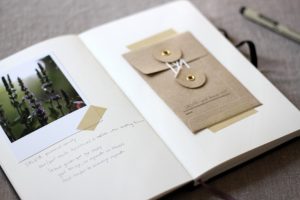
Much of what is learned as a gardener is through trial and error. Even after all the reading and consulting, sometimes we make gardening choices that just don’t work out – like where to plant a certain vegetable or how often we should water! These are the kinds of notes you keep in a gardener’s journal. You can include photos and information about what plants grew well together, what problems you had, and even what plants have disappeared. There is no teacher like experience!
As teachers, we give a lot of thought to the pedagogical choices that we make. Sometimes our choices are the right ones, and sometimes not. Despite our best efforts to remember everything that we experience, it is important to reflect on our practice and give ourselves the opportunity to really digest what has happened. For me, keeping a journal has been critical in inspiring me to take further action. The act of writing an initial entry is cathartic, but what has had the most impact for me is looking back on what I have written and using it as a springboard for action. What started as just a journal became a source of inspiration and change.
~ Develop dispositions of inquiry and critical reflection to understand and develop their practices ~
The GDE program has taught me a lot about myself, a lot about my students, and even more about how these two things come together. Through the experiences of the last couple of school years and the program, I have experienced the value of critically reflecting on my teaching practice regularly and intentionally, and the significant impact that this can have on my students’ learning.
As teachers, most of us naturally critique our own practice. We strive to teach a lesson better than the last time, to be more clear in our instruction, we try to be better versions of ourselves. However, once something seems to work, do we keep questioning it? When a method fits, when the student learns, when the lesson goes well, we may be less likely to keep looking at our practice with the same critical eye. Yet, our students are always changing – each day, each year, from one assignment to the next their needs are different. So, as their teacher, how do I keep up? I learned that the first step is to recognize that something needs to change and keeping a professional journal has done that for me. Furthermore, inquiry has helped me gain new levels of perspective and assume different vantage points into my role as a teacher.
I started journaling as a requirement of the GDE program, but soon it became second nature. My journal became a collection of provoking thoughts and wonderings about my life as a teacher. I wrote about things my students did, things they said, I wrote down ideas I had for teaching, titles of articles or books I wanted to read, brainstormed ideas about how to connect with certain students, and so much more. Although the initial act of writing was helpful in sorting out my thoughts, what was more valuable was looking back on these entries and making sense of them. One of the entries I commonly look back on is the brainstorming that I titled “How Can I Better Teach Positive Skills/ Behaviours?” This question very much captures the main vein of what I have reflected on this year and that is how to better teach study skills in a way that instills independence and resourcefulness, so that students with high needs don’t develop a high dependence on their support teachers, but rather learn to depend on themselves. Ultimately, what keeping a journal has provided for me is accountability. By writing down and revisiting my own thoughts, I have taken the first steps toward action.
As Smith (2004) points out, “one of the continuing concerns for teacher educators is the extent to which prospective teachers can make the transition between the theories and ideas they are exposed to in a university setting, and their enacted practice in a school-based setting“ (p. 1). Smith illustrates the disconnect that can happen between what we know as teachers and what we do as teachers and proposes that bridging that gap requires systematic and intentional inquiry. I can recognize that for me, the GDE program is what has instigated the development of my inquiry stance as a teacher and that without it I may have never taken on the task of reading the literature and employing new pedagogical methods into my practice. However, looking back now, all three of the inquiries that I took on during this program are what have led to a deeper sense of who I am as a teacher and provided me with the traction I needed to feel like I can lead change.
